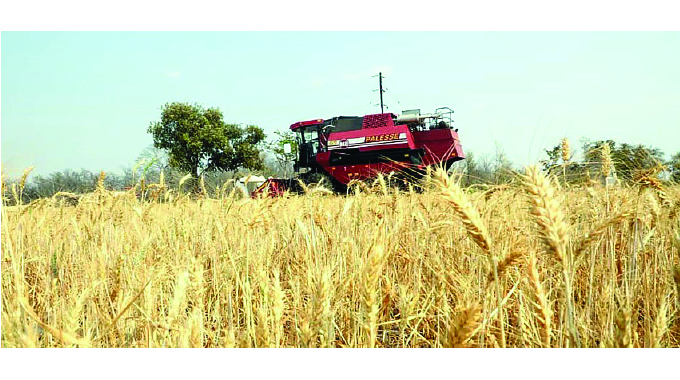COMMENT: Let us work to reap what we sowed

THE Government projected a month or two ago that the country will achieve a record wheat harvest this year — 380 000 tonnes, which is 20 000 tonnes more than national requirements for a year.
That projection was based on the size of land that was under the country’s second most important cereal after maize, the staple. Through assistance from the Government and the corporate sector, farmers were this year able to put 79 000 hectares under wheat. Growing conditions were also superb as irrigation water was available, inputs were availed on time and electricity was available through the growing period.
However, we are concerned, as we report elsewhere today, that farmers have so far harvested about 190 000 tonnes with as many tonnes still in the fields this late into the wheat season.
We are worried because rains have started falling across the country yet half of the projected harvest is still to be picked.
Agricultural Rural Development and Advisory Services chief director, Professor Obert Jiri, said while managing bush fires has remained among the farmer’s top concern, these have since receded as a result of lowering of temperatures due to high humidity. However, the decline in temperatures as a result of the rains may have created a new challenge. It poses a threat to the quality of the 190 000 tonnes of the crop which are still in the fields. Apart from affecting the quality of the harvest, the wetness arising from the rains can make it difficult for combine harvesters to effectively move in the fields as the ground may be too soft to withstand the immense weight of the pieces of machinery.

Professor Obert Jiri
“The rains will obviously affect harvesting and quality of wheat if it persists. We have harvested almost half of the expected tonnage,” he said.
Mr Paul Zakariya, director of the Zimbabwe Farmers’ Union, also expressed concern over the rains.
“It looks like the rains will be upon us soon. Wheat should be out of the fields,” he said.
We are concerned just as Prof Jiri and Mr Zakariya are. Many growers must be worried as well that the hard work they put in and the public excitement that had been generated by the prospect of a record harvest could dissipate if the rains persist.
We aren’t certain as to why the harvesting has taken so long. We don’t think the rains have come too early. The challenge could be a shortage of combine harvesters or failure by farmers to pay for the service.

The Agricultural Rural Development Authority (Arda)
Whatever the reason, we must indicate that farmers, the Government and other stakeholders must work very hard to ensure that we don’t fail to reap what we sowed. Having prepared so hard and raised everyone’s hopes, it would be regrettable if we miss the record because of failure to securely and timely gather what we grew. It will be no different from a farmer who realises a bumper harvest but goes on to lose everything due to destruction of the harvest by weevils, rodents or poor post-harvest management.

We urge all the stakeholders — farmers, Government and their private sector — to engage so that the crop is out of the fields and sent to the Grain Marketing Board on time. This might entail those who own combine harvesters making them available to those who don’t. They can work out payment modalities that produce a win-win situation — the farmer being able to pick their crop on time and the owner of the combine getting reasonably paid for the service. If need be, barter arrangements can be worked out. The owner of the machinery makes it available and the farmer pays by way of an agreed number of tonnes of wheat.












Comments